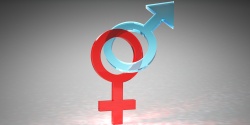Published: 10.03.2023

· The European Court of Human Rights has dismissed the complaint of a French man suffering from hermaphroditism who demanded that a notation of "neutral" or "intersex" gender be entered on his birth certificate.
· The courts refused, pointing out that his request was essentially a demand for the establishment of a "third gender," while French law only recognizes male and female sex.
· Moreover, the man was married to a woman with whom he was raising an adopted child.
· The man filed a complaint with the European Court of Human Rights, alleging that the courts violated his right to privacy.
· The Court dismissed the complaint, pointing out that the division between male and female sex in the law is justified by the specifics of civil status records, which include birth certificates, and that adding a "third sex" would require a complete remodeling of the legal system.
· The case involves a French citizen who was diagnosed at birth with hermaphroditism, also known as hermaphroditism (having both male and female biological characteristics). His birth certificate classified him as male.
In 2015, he requested that the public prosecutor send a request to the president of the grand tribunal (France's judicial body of first instance) in Tours to revise his birth certificate by replacing the notation of male sex with the notation of "neutral" or "intersex." The court granted the request and ordered the birth certificate to be amended. In 2016. However, the Court of Appeals in Orléans overturned this ruling, pointing out that while the fact of the applicant's hermaphroditism is undisputed, he has looked and acted like a man for years, as evidenced by the fact that he married a woman with whom he is raising an adopted child, as well as the circumstance of his testosterone use. Regardless, the court's recognition of a "third gender" would constitute an impermissible interference with the competence of the legislature, which has so far provided for only two genders. The Court of Cassation upheld the verdict, sharing the second-instance court's arguments and adding that implementing the complainant's request would require a complete remodeling of French law, based on the division of society into two sexes.
In 2017, the man filed a complaint with the European Court of Human Rights, accusing French courts of violating his right to respect for private life (Article 8 of the European Convention on Human Rights). The complainant pointed out that not only biologically, but also psychologically, he identifies as an intersex person, and the state should recognize his identity by correcting his birth certificate accordingly.
In 2023. The ECHR dismissed the complaint by a majority of 6 votes to 1, holding that the inability to register hermaphroditism as a "third sex" is justified by the principle of inalienability of civil status and the need to protect the integrity and reliability of civil status records. The Court stressed that "in matters of general policy, where opinions within a democratic society may vary considerably, special weight must be given to the role of the national legislature."
- The Court's judgment is a voice of reason, expressing respect for one of the oldest legal principles, which is the division of society into two sexes determined by biological characteristics. Of concern, however, is the caveat in the ECHR's reasoning for the judgment about the Convention being a "living instrument" whose understanding can change depending on "current circumstances." This vague reference suggests that the Court reserves the right to change its position in the future," noted Weronika Przebierała, director of the International Law Center of the Ordo Iuris Institute.
The case of Y. v. France, ECHR judgment of January 31, 2023.

14.05.2025
• In Nairobi, the 2nd Pan-African Conference on Family Values is taking place with the participation of representatives from Ordo Iuris.

09.05.2025
• Representatives of the Ordo Iuris Institute will participate in the Pan-African Conference on Family Values, which will begin on May 12 in Nairobi, the capital of Kenya. Ordo Iuris is a partner of the event.

07.05.2025
• The European Court of Human Rights has upheld a complaint by a same-sex couple whose Polish registry office refused to register a marriage contracted in the United Kingdom. This is the fourth judgment in which the ECHR indicates that Poland has an obligation to ensure that same-sex couples can formalize their cohabitation.

17.04.2025
• The Ordo Iuris Institute has prepared an opinion for the UN as part of a thematic report on surrogacy and its impact on the rights of women and children.